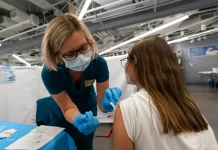In the days since Oxford University and AstraZeneca unveiled the results of the partnership’s Phase 3 Covid-19 vaccine trials, a growing number of questions have emerged.
In the days since Oxford University and AstraZeneca unveiled the results of the partnership’s Phase 3 Covid-19 vaccine trials, a growing number of questions have emerged.
And Moderna’s supply will be tied up with the US for at least probably the first half of 2021, so in light of that, the Oxford/AstraZeneca vaccine is really good news for the rest of the world,” Andrea Taylor, assistant director of programs at Duke Global Health Innovation Center.
AstraZeneca has promised to supply hundreds of millions of doses to low and middle income countries and to deliver the vaccine on a not-for-profit basis to those nations in perpetuity.
She said that as Moderna and Pfizer build up information and manufacturing capacity, they may be able to find storage methods at higher temperatures, but the Oxford vaccine “has the potential to be able to be shipped more readily around the globe” using existing supply chains.
AstraZeneca has pledged 300 million doses of its vaccine to COVAX, a partnership between GAVI, the vaccine alliance; the World Health Organization; and the Coalition for Epidemic Preparedness Innovations (CEPI) for ensuring equitable distribution to 92 developing countries.
A GAVI representative told CNN that the Serum Institute of India (SII) and Bill and Melinda Gates Foundation would also provide up to 200 million doses of the AstraZeneca and/or Novavax candidate vaccines to lower-income countries.
AstraZeneca says it expects to be able to have capacity to produce up to 3 billion doses of the vaccine in 2021 on a rolling basis.
After calls for transparency from groups such as Medicins Sans Frontieres and Global Justice Now, AstraZeneca and Oxford confirmed that the partnership would deliver the vaccine on a not-for-profit basis until at least July 2021 worldwide, and in perpetuity to low and middle income countries.
The Oxford vaccine is cheaper than the others, at approximately $3 to $4 per dose in contrast to about $20 for the Pfizer vaccine and $32-37 for the Moderna vaccine.



















